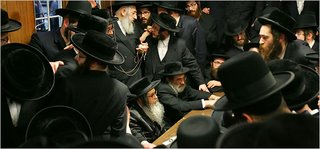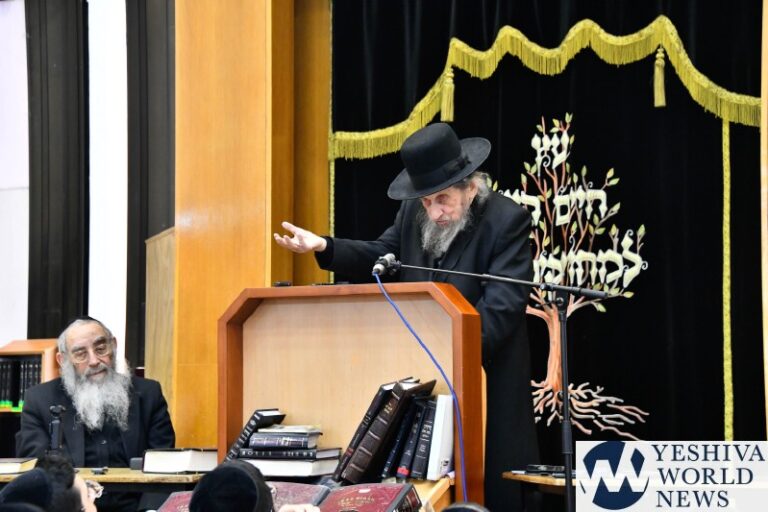TIMES:
Zalmen Teitelbaum, seated in foreground, with mourners in his father’s house yesterday. He was named the grand rabbi in his father’s will.

The dispute over which of Moses Teitelbaum’s sons will succeed him as the grand rabbi of the Satmar sect of Hasidic Jews raged in and out of court for the last six years of his life.
The casket of Rabbi Moses Teitelbaum was carried through a crush of followers Monday night in Williamsburg, Brooklyn.
Rabbi Teitelbaum’s death last night appears unlikely to bring the controversy to a close.
Less than two hours after the rabbi died, as tens of thousands of grieving Satmars thronged the streets of Williamsburg, Brooklyn, and Kiryas Joel, N.Y., a judge in Orange County issued several orders. Rabbi Teitelbaum’s third son, Zalmen, lives in Williamsburg; his eldest son, Aaron, lives in Kiryas Joel in Orange County.
The orders were issued by Judge Stewart A. Rosenwasser at the request of Aaron Teitelbaum’s supporters. They included measures to maintain order and decorum during the funeral and the mourning period to follow, and to make sure that neither Aaron’s nor Zalmen’s supporters were shut out.
But Zalmen Teitelbaum’s supporters say the orders also contain language intended to solidify the claim to power of Aaron’s supporters.
They appealed the orders this afternoon, and an appellate judge agreed to strike much of the ruling they objected to.
Zalmen’s supporters also said the Satmars’ own rabbinical court formally declared Zalmen the sect’s new grand rabbi last night.
A spokesman for Aaron’s supporters, Richard J. Schwartz, said that Judge Rosenwasser’s rulings were meant to apply only to the funeral and related events, not to settle the overall dispute. And he added that it was the Satmar board of directors, not the grand rabbi or the rabbinical court, that would appoint the next grand rabbi.
People who have been observing the battle for years do not expect a quick capitulation by either side.
“Since 2001,” said David M. Pollock, associate executive director of the Jewish Community Relations Council in New York, “every facet of this disagreement has ended up in the civil courts. I would expect that the issue of succession will go there, too.”
The stakes are high both materially and spiritually. The Satmars, a fast-growing sect of some 100,000 ultra-Orthodox Jews, based in Williamsburg but spread around the world, run a vast private school system, real estate holdings worth hundreds of millions of dollars, a famed matzo factory and a network of social services.
Like other Hasidim, the Satmars vest tremendous authority in their grand rabbi; he is the arbiter of every aspect of their spiritual lives as well as the guiding voice of the community.
The Satmar grand rabbi, Moses Teitelbaum, who was 91 when he died on Monday, named Zalmen head of the sect’s main synagogue in Williamsburg in 1999. Years before, he had named Aaron head of the congregation in Kiryas Joel, a Satmar enclave 55 miles northwest of New York City. The brothers are both in their mid-50’s.
Zalmen’s supporters, most of whom live in Brooklyn, said the Williamsburg appointment made him the logical successor to the grand rabbi. Supporters of Aaron, most of whom live in Kiryas Joel, said the appointment of the younger son was fraudulent and filed the first of several suits.
The dispute has occasionally erupted into violence. More than two dozen people were arrested in a fight in the Williamsburg synagogue last year after Judge Rosenwasser issued another ruling that supported Aaron’s position.
Despite the gathering and dispersing of huge crowds last night and today, there has been little unrest and no arrests. But the jockeying goes on as ever.
One of Judge Rosenwasser’s orders Monday night gave Zalmen Teitelbaum’s faction until Wednesday morning to counter a holding that the head of the pro-Aaron faction, Berl Friedman, as the rightful president of the board of the Williamsburg congregation, was authorized to take action to ensure that the funeral proceeds peacefully.
The order also instructed the police in New York City and in Kiryas Joel to assist Mr. Friedman.
The wording was similar to parts of Judge Rosenwasser’s decision in February, which held that Mr. Friedman is the head of the congregation’s board. But that decision was immediately appealed, and in March, an appellate panel froze it from taking effect until various appeals are resolved.
The lawyer for Zalmen’s supporters, Scott E. Mollen, called Judge Rosenwasser’s new order “an obvious effort to do an end run around the Appellate Division’s order of March 2006.”
Late this afternoon, a judge in the Appellate Division, Joseph Covello, struck the parts of Judge Rosenwasser’s order that granted powers to Mr. Friedman. Other parts of the order will be argued before Judge Rosenwasser on Wednesday morning.
Mr. Schwartz said the order that Aaron’s supporters sought, and that Judge Rosenwasser granted Monday, was intended simply to ensure civil behavior during the period of mourning. “Now that some of the controls have been removed from the initial ruling,” he said, “we trust that all members of the community will continue to behave as orderly and peacefully as they have thus far.”
David Weber, one of the thousands of mourners who gathered outside the grand rabbi’s residence on Bedford Avenue in Williamsburg this morning, said that while the question of who succeeds Moses Teitelbaum was crucial, peace was paramount.
“We hope whatever is going to be, will be very peaceful,” he said. That, he added, would be “the best way to honor the rebbe.”
Related Rabbi Moses Teitelbaum Is Dead at 91 .
NBC:
The leader of an ultra-Orthodox sect who died of cancer this week arranged for an organized succession by naming one of his two sons as the next grand rabbi of the Satmar Hasidim, religious authorities announced Thursday.
In his will, Rabbi Moses Teitelbaum, who died Monday at the age of 91, recognized Zalmen Teitelbaum, the third of his four sons, as the next rebbe, or grand rabbi.
“He shall occupy my position and succeed me without any shortfall, for effective immediately I have granted him the position,” Moses Teitelbaum wrote in his will.
But the decision, announced by the Satmars’ Rabbinical Court, is unlikely to settle the divisive issue of succession that has pitted Zalmen Teitelbaum, 54, against the eldest brother, Rabbi Aron Teitelbaum of Kiryas Joel in upstate New York.
That is because Aron Teitelbaum has thousands of his own followers who believe he is the rightful successor.
The brothers have been feuding over the question for years. In 2004, a judge in Brooklyn refused to rule in the sons’ dispute over the heir to the Satmar sect, saying the matter was for the grand rabbi to decide.
In his will, Moses Teitelbaum also directed that “not one of my descendants or among the persons within the community shall challenge or commit any act to diminish the powers of the above-mentioned appointment.”
Moses Teitelbaum led the Satmar congregation in Brooklyn after the death of Grand Rabbi Joel Teitelbaum in 1979. He helped guide the fast-growing Satmar Hassidim in Brooklyn, Israel and other spots around the world.
The Satmar Hasidic sect has between 65,000 to 75,000 disciples in the United States, with almost all of them living in New York state. The biggest congregations are in Williamsburg and the town of Kiryas Joel, about 45 miles northwest of New York City.
Moses Teitelbaum was buried in Kiryas Joel early Tuesday after a service in Williamsburg that drew thousands of followers.
(Grand Rebbe Moses Teitelbaum Dies
Thousands Gather For Burial
Leaders React To Rebbe’s Death) .
…The Satmar community is the fastest-growing ultra-orthodox sect in the world, controlling a $1 billion real estate and social services enterprise. It claims more than 100,000 members — in Brooklyn; Montreal; Antwerp, Belgium; and Jerusalem. An additional 19,000 live in Kiryas Joel, an entirely Hasidic town 25 miles north of New York City.
But no one has devised a clear process for picking a new grand rebbe — succession wars and angry splits are common among Hasidic sects. In theory, the grand rebbe anoints a successor, a rabbinical court agrees, and the choice meets with approval.
In the case of the Satmar, Teitelbaum’s eldest son, Aaron — who is chief rabbi in Kiryas Joel — expected to succeed his father. But in his later years, Moses Teitelbaum came to see Aaron as headstrong and, perhaps, not capable of leading the entire sect.
So the father appointed a younger son, Zalmen, to run the Williamsburg congregation, splitting his empire.
Aaron never fully accepted the decision. Save for a few brief words of commiseration Monday evening, the middle-aged brothers have not spoken to each other in more than seven years, say advisers to the two men. Most Satmar Hasidim have lined up behind one brother or the other — the sides are known as the “Zalis” and “Aaronis” — and the past decade has been punctuated by fistfights, broken legs and arms, torched cars and homes…
Bloomberg:
The battle over a $500 million religious empire, marked by beatings, break-ins and a street riot, likely will escalate with yesterday’s death of Grand Rabbi Moses Teitelbaum, leader of the ultra-orthodox Satmar sect of Hasidic Jews…..Two of his sons, Aaron and Zalman, have waged a five-year legal battle seeking to control the main congregation’s board, each working to succeed their father at the head of the largest Hasidic sect, based in Williamsburg, Brooklyn. At stake is control of synagogues, real estate, businesses, religious schools and the jobs and social services that go with them…….This is a fight over power, prestige and patronage,” said David Pollock, an official with the Jewish Community Relations Council of New York who has worked with the Satmars for the past 20 years. Violence has broken out when the legal outcome is unclear, which it is now……….Life revolves around the temple and religious study. Satmar is also the corporation.This is a dispute between individuals who claim to be elected to the board of directors, over control of the board of directors and its assets — Congregation Yetev D’Lev Satmar Inc.,” Jeffrey Buss of Smith, Buss & Jacobs LLP, lead attorney for Aaron’s camp, said in an interview. That religious corporation has approximately $500 million dollars worth of assets, at least.” The troubles surfaced in 2001, when Moses Teitelbaum named his third son, Zalman, chief rabbi of the Williamsburg synagogue that is at the heart of the sect. About 40,000 Satmars live in Williamsburg and 5,000 in nearby Borough Park….Satmar affairs are governed by tradition and the bylaws, with the grand rabbi as final arbiter of everything, Mollen said. The conflict became violent in October 2004, after Zalman won a victory in State Supreme Court in Brooklyn. Judge Melvin Barasch ruled that the competing boards’ legitimacy rested on questions of Satmar membership that were religious, not civil, and declined to intervene, saying it was the grand rebbe’s province to decide. He also wrote an addendum to his decision complaining of harassment and other possibly criminal behavior by Aaron’s side. That left Zalman effectively in charge in Williamsburg. Backers of Rabbi Aaron entered the main temple before High Holy Day services and reportedly locked Rabbi Zalman in his adjacent apartment. They were then beaten by Zalman followers, with at least one victim saying he had broken bones…….










